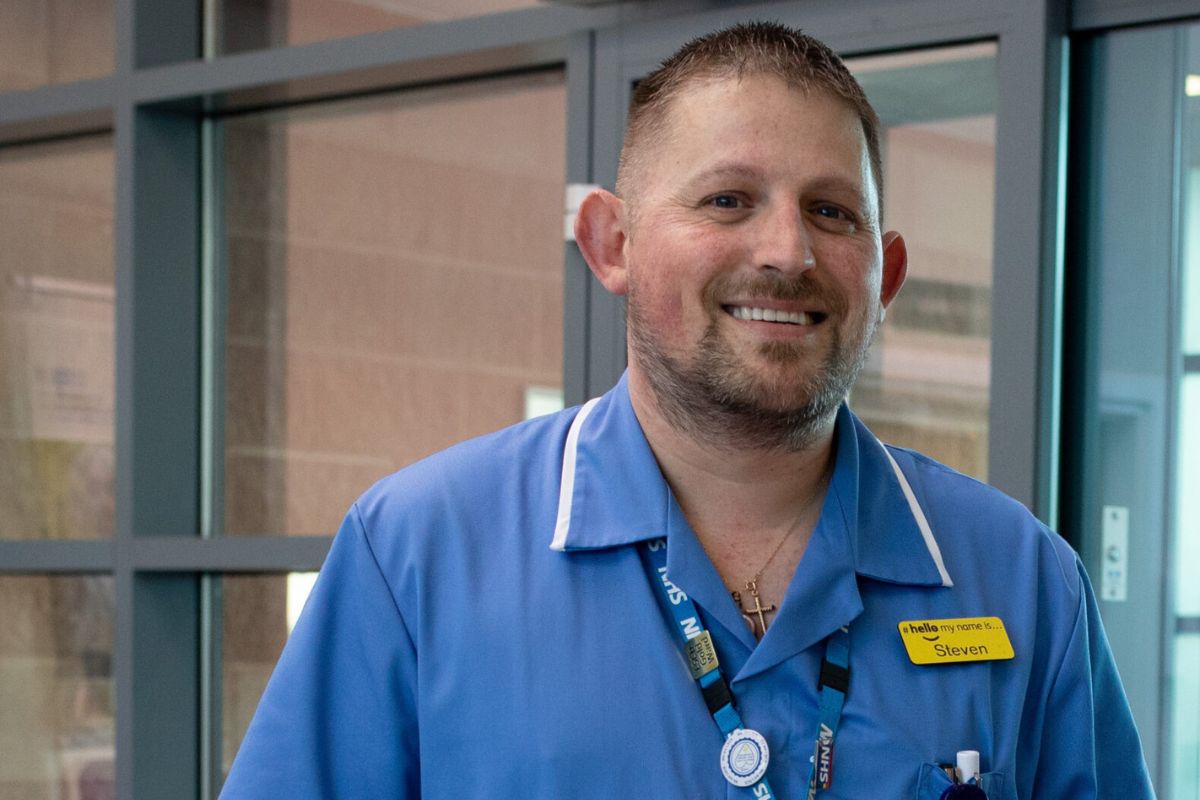NHS apprenticeship ‘truly changed my life’

A former greengrocer has described how an NHS apprenticeship “truly changed” his life and set him on the path to becoming a nurse.
At the start of National Apprenticeship Week, Steven Jewell, aged 42, who left school at 15 with no qualifications, told how he recently completed the Registered Nursing Degree Apprenticeship and now works at Lancashire and South Cumbria NHS Foundation Trust.
After a range of jobs, including owning a greengrocer shop, he changed careers and joined the NHS as a healthcare support worker, before starting his apprenticeship.
The NHS is the nation’s biggest trainer of apprentices, with more than 20,000 starting last year.
Apprentices are a crucial part of the NHS Long Term Workforce Plan and NHS England aims to triple the number being trained by 2030, so they make up more than one in five new recruits.
Steven said:
“Without the apprenticeship, I would never have been able to go to university or be in the position I am today. At nearly 40, being afforded the opportunity to earn a salary while taking a degree level course with blended work-placed learning, truly changed my life.
“The apprentice route has enabled me to go from greengrocer to registered mental health nurse in just over four years. I am now in a job I love, helping other people, as well as changing my life for the better. Don’t ever think you are too old or not smart enough. Apprenticeships provide all of us with equal opportunities to our peers, and enable us to change course in life – we just have to want it.”
Apprenticeships offer routes into many of the more than 350 NHS careers, meaning people can “earn while they learn” – working for their local NHS, but without having to go to university first.
This includes a range of higher or degree apprenticeships (equivalent to foundation, full Bachelor’s or Master’s degrees), including nursing.
And the Medical Doctor Degree Apprenticeship pilot, due to be launched this year, is the first of its kind in the world and an important step forward in helping to attract a wider range of candidates to medicine. It will initially be delivered with three Higher Education Institutes.
NHS apprenticeships also include a variety of entry-level roles including support staff – helping employers attract talent from local communities and ensuring people from all backgrounds get the chance to pursue a rewarding career.
With the increased focus on data and move to electronic patient records there is also a focus on digital apprenticeships to attract new talent into tech roles in the NHS, with opportunities ranging from Data Technician to Artificial Intelligence Data Specialist.
Professor Mark Radford, Director of Long Term Workforce Plan Delivery and Education, and Deputy Chief Nursing Officer at NHS England, said:
“Apprentices are at the heart of our Long Term Workforce Plan, to put staffing on a sustainable footing and improve patient care.
“Apprenticeships are a fantastic tool, not only to attract new talent to the NHS but also to develop the skills of the existing workforce.
“Our ambition for apprenticeships is to continue to build on the fantastic success of the expansion to date and provide an alternative route to careers such as nursing and Allied Health Professions. Working with UCAS from 2025 young people will also be able to apply for apprenticeships at the same time as traditional degree programmes.”
Health Minister Andrew Stephenson said:
“I am delighted to see the NHS has emerged as the country’s top trainer of apprentices – with over 20,000 starting last year – showing just how many people continue to value a career in the health service.
“Apprentices are an integral part of the NHS’ Long Term Workforce Plan. We’re committed to boosting training for clinical staff through apprenticeships over the coming years, as we continue to deliver long term change for a brighter future.
“The introduction of the groundbreaking Medical Doctor Degree Apprenticeship will further widen participation from under-represented backgrounds — inspiring more people to pursue their dreams while allowing them to earn while they learn.”
Minister for Skills, Apprenticeships and Higher Education Robert Halfon said:
“The NHS serves the nation’s health needs every single day and apprenticeships are a crucial way for the health service to get the staff it vitally needs. NHS England is one of our Top 100 apprentice employers, and embraces both apprenticeships and T Levels as great ways to get skilled healthcare workers.
“Apprenticeships are crucial to giving people from all backgrounds the chance to climb the ladder of opportunity and it’s fantastic news that they plan to recruit one in five of their employees as apprentices by 2030. The NHS understand the apprenticeship levy and use it well, and I hope more employers follow their lead and experience the benefits of apprentices for themselves.”
Jennifer Coupland, chief executive of the Institute for Apprenticeships and Technical Education (IfATE), said:
“It’s brilliant to see that so many people are reaping the benefits of world class apprenticeships, designed by employers. They are popular across the country and with a really good variety of occupations.”
More information on NHS apprenticeships is available here.











Responses